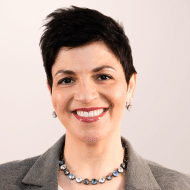
Lisette Garcia
Chief Research Officer
Hispanic Association on Corporate Responsibility
MFP Campaign Co-Chair
MFP Cohort 33, 2006-09
What does the ASA Minority Fellowship Program (MFP) mean to me? The MFP is a family. Yes, the MFP provides the traditional things a fellowship program provides – an orientation to the discipline, an opportunity to work on your dissertation without interruption, a network of current and former scholars to share ideas and career opportunities with – but it’s also a family.
At different times during my professional career the MFP has been the people I could ask questions, a place where I could seek refuge when things weren’t going as planned, and a source of comfort when I needed to regroup and perhaps redirect my career. The MFP fellows and staff have been there for me, and they still are.
As a first-generation PhD. student, there was so much that my family didn’t understand and couldn’t help me with, but my cohort could and so could the program leadership. The MFP staff’s door was always open to provide counsel, even after finishing my degree. Not too long after finishing my degree and taking a multi-year postdoc, I was diagnosed with cancer. I turned to MFP colleagues yet again for career advice. You see, my partner and I had been living in different states – ahh, the life of academics – and after my cancer diagnosis, I had to make some tough decisions that would ultimately affect my career, including whether I wanted to continue to live away from my partner. The challenge was that the academic positions that were available in his area at that time wouldn’t allow me to care for my mother and be financially stable. I had to decide – move and leave the academy or stay but be apart from my partner. After much discussion with my MFP family, I made the decision to leave higher education and join a non-profit. This career move was the best thing I could have done for myself personally and professionally. It has opened so many doors for me and enabled me to use my degree in ways I never thought possible.
Being part of the MFP family has also meant an instant connection with other MFP alumni. When you meet another Fellow, it’s like you’ve known each other your whole life; there’s so much to talk about. I have made so many connections through the MFP and I have a cadre of colleagues and lifelong friends as a result. And although my career has taken a path outside of the traditional route, I choose to stay connected to the discipline and that is largely because of the MFP program and what it has meant to me.
So, thank you to ASA for providing this opportunity to me and to other scholars. Let’s continue the tradition that this program started 50 years ago, a tradition of supporting doctoral students of color and ensuring that our discipline is full of diverse leaders who are ready to catapult sociology into its research and teaching future in our global society